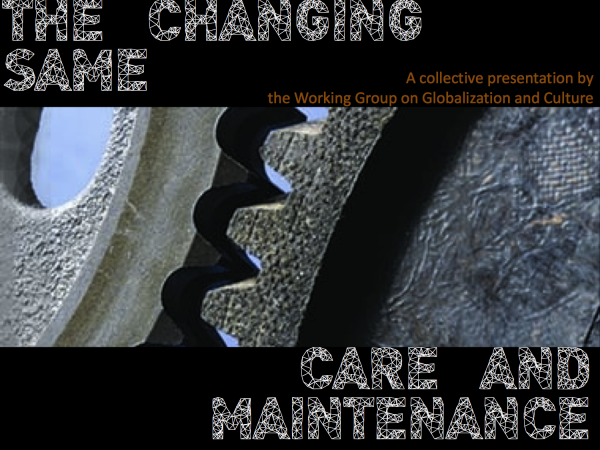Rather than looking to the new and innovative, what if we stopped to consider the forces that keep things as they are? In this collective presentation, the Yale Working Group on Globalization and Culture takes up the critical issues of maintenance and care—the changingsame, the constant need to maintain life and its infrastructures. From the frequent reminders to update to the newest software to one’s daily grooming or self-care, daily and routine maintenance and care permeates household life and interpersonal relationships, mental and physical health; it is also central to the functioning of social infrastructure and grids. If “the problem of maintenance becomes visible when it is lacking,” (as David Edgerton writes in The Shock of the Old), a “crisis of care” emerges when, as Nancy Fraser has noted, the “logic of economic production overrides that of social reproduction.” Our papers explore the exceptionable regimes of life support; the routine infrastructures that maintain colonial and imperial power in space; and the politics, networks and industries of care. Why it is so hard to stay the same and why do we spend so much time and energy to do so? Whether we are maintaining instruments or social status, infrastructure or bodies, the unglamorous labor of keeping things from falling apart is the undervalued preponderance of any system’s energetic economy.
- Peter Raccuglia, “Love Notes”
- Randa Tawil, “Storied Crossings: Syrian Migration and Acts of Maintenance in Nuevo Laredo”
- Courtney Sato, “Educational Networks of Care and Maintenance: The Barbour Scholarship for Asian Women”
- Damian Vergara Bracamontes, “Migrant Care Practices in Detention”
- Gabe Winant, “From Absolute Care to Relative Surplus Care”
- Alyssa Battistoni, “On Maintenance”
- Michael Denning, “Care without Servitude?”
- Sigma Colon, “Kings of Nowhere”
- Jonny Bunning, “Maintaining Life: Biopolitics and the History of Intensive Care”
